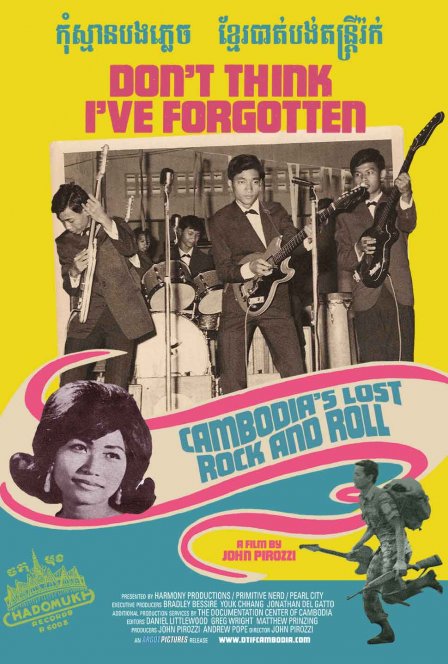What would have happened to the American spirit if in the midst of the Summer of Love in San Francisco if a violent force destroyed all of the artists, musicians, and the community that flourished around them? It’s difficult to conceive of what would have been lost and broken. Yet, that is exactly what happened in Cambodia in the 1970s as the drama of the Cold War spilled into its borders when the Khmer Rouge decimated a quarter of its population, including ethnic minorities, religious groups, intellectuals, and artists. As a result, the free-spirited Cambodian pop scene, which electrified dance halls for throngs of ecstatic youth, came to an abrupt halt as the Cold War descended upon the country.
Don’t Think I’ve Forgotten: Cambodia’s Lost Rock and Roll, directed by John Pirozzi, focuses on this abrupt curtailing of Cambodia’s golden age of pop. From the idealistic beginnings of the newly independent Cambodia to the tumultuous violence that erupted in the 1970s, the film unfolds a story with notes of both joy and tragic darkness. Interviews with musicians, family members of musicians, historians, and political figures give us a story told first hand of the rise and fall of the Cambodian music scene in Phnom Penh. While hippies were gathering in San Francisco, Cambodia was experiencing a cultural renaissance of its own. Fueled by the new music coming in from abroad and state funding for the arts, a free spirit permeated Cambodia as it came into its own. The film introduces the audience to key figures of the Cambodian pop scene including Sinn Sisamouth, Ros Serey Sothea, Pen Ran, and Yol Aularong. For those new to the genre, it paints portraits (sometimes literally with painted animations) of what made each artist unique. Sinn Sisamouth appealed across generations and was like the father figure of the music movement, whereas Yol Aularong and his band reflected a youthful rebelliousness. Ros Serey Sothea voice displayed beauty and drama, and Pen Ran’s music was an edgy and fun-loving counterpoint. Influences from rhythm and blues, French new wave, and American rock & roll created a fantastic blend of traditional and international sounds.
Tragically, Cambodia’s neutrality in the Cold War could not be sustained. The exuberant atmosphere of the Golden Age of Cambodian Pop takes a dark turn as the film turns our attention to the several years long US bombing campaign which sought to eradicate the Communist presence in the countryside. Like Joshua Oppenheimer’s documentaries the Act of Killing and The Look of Silence, which tell the story of the Indonesian genocide of the mid 1960’s, Don’t Think I’ve Forgotten likewise points to the US government’s role in supporting an anti-Communist regime which in turn led to rampant bloodshed. Stories such as these remind us that history has a way of repeating itself, especially as we reflect on the current US involvement in the Middle East.
Despite this violent snuffing out the flame of the Cambodian music scene in the 1960s and early 70s, its spirit still resonates today. Just as Cambodians appropriated and reinvented the Western pop sounds they heard from abroad, musician from around the globe today are incorporating Cambodian pop into their own work. One such band is Dengue Fever — the subject of Pirozzi’s first feature documentary, Sleepwalking Through the Mekong — which is composed of five Los Angelenos and a Cambodian American singer. As such, they represent a modern synthesis of Cambodia and the West in a rich conversation that crosses cultures and several decades. The relative popularity of bands such as the Cambodian Space Project, started by a Tasmanian and a Khmer musician, also attests to Cambodian music’s international reach. These collaborations, and the resurgence of psychedelic pop, hint at a new golden age for Cambodian music, and indicate the resiliency of a people who have reincarnated the past into a hopeful future.

